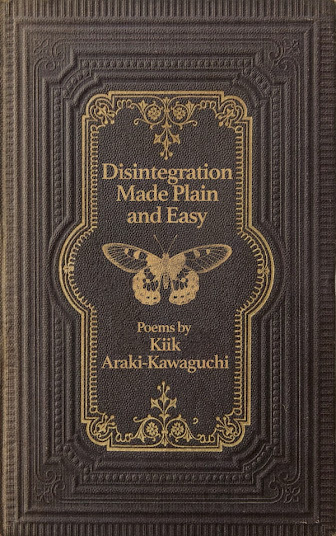Kiik Araki-Kawaguchi, Disintegration Made Plain and Easy
another day another
Another day another
Soup god I
Am simple I
Will dunk my
Bread into the
Rain whatever juices
In the nightbowl
I make love
My mouth is
Full of bread
The moon stops
Like a clock
Overhead god how
I fall how
Must I eat
Twice my weight
In salt
 I’mreally enjoying the narrative connections, disconnects and accumulations of thepoems in Bellingham, Washington poet Kiik Araki-Kawaguchi’s DisintegrationMade Plain and Easy (Chicago IL: Piżama Press, 2025). This is the firstvolume in a new press founded and run by Chicago poet Benjamin Niespodziany, “dedicatedto showcasing and uplifting the voices of the strange, the uncanny, the absurd,and the surreal.” I’ve been aware for some time that Niespodziany has quite agood eye for such work, his social media and substack long offering remarkablygood examples of poems and poets I might otherwise have not been aware, fromthe contemporary to the historical, working the surreal short, condensed and/orprose poem.
I’mreally enjoying the narrative connections, disconnects and accumulations of thepoems in Bellingham, Washington poet Kiik Araki-Kawaguchi’s DisintegrationMade Plain and Easy (Chicago IL: Piżama Press, 2025). This is the firstvolume in a new press founded and run by Chicago poet Benjamin Niespodziany, “dedicatedto showcasing and uplifting the voices of the strange, the uncanny, the absurd,and the surreal.” I’ve been aware for some time that Niespodziany has quite agood eye for such work, his social media and substack long offering remarkablygood examples of poems and poets I might otherwise have not been aware, fromthe contemporary to the historical, working the surreal short, condensed and/orprose poem. Disintegration Made Plain and Easy is set in twocluster-sections of poems, interspersed with illustrations (as well as an “INTERMISSION”between the two sections of poems) by Los Angeles-based illustrator, animator and interaction designer Gautam Rangan. “I like to get naked // I guess becauseit makes // Me think about death,” Araki-Kawaguchi writes, to open the firstpoem in the collection, “i like to get naked,” which stretches across threepages in a monologue reminiscent of the classic “Sex at 31” series (a series I’m sure no one actually recalls anymore), around death, sex and moving throughtime. The accumulative rhythms of Araki-Kawaguchi’s poems I find quitefascinating, as they suggest themselves as purely self-contained phrases piled atopeach other, offering, instead, real subtle twists and turns connecting phrases andrhythms as much between the lines as through. And then, of course, there arethe incredible “about the author” poems, six of which are sprinkled through thecollection, the second of which, a prose poem, begins: “The most striking thingof Kiik Araki-Kawaguchi’s poetry is he is so damn FINE. The words combining onhis page aren’t great. But as a reader you can imagine him freaking GOOD in hiscutoff shorts. Tan as lobster. At a rectangle in starbucks. Implement betweenwriting claws. Gazing moronically into the blank page.”
Araki-Kawaguchi’spoems are surreal, funny, dark and odd, composed via direct statements that accumulateacross distances, even through the prose poem structure, writing sentences thatpile atop each other to form shapes. His use of the double-space betweenstatements and phrases, for example, even provides a kind of pause for the reader,holding back what otherwise might seem propulsive through other poems,including those set as more direct prose-stanzas. There is something quiteremarkable in the way he twists and turns expectation, offering from the offseta point from which one couldn’t even begin to suspect, once you’ve read one or twoexamples of his work; he offers establishing direction almost as red herring,playing with expectation, and rushing off into completely unique and unknownrealms. “Devil devil in my heart,” the poem “devil devil in my heart” begins, “Icreated earth and heaven / In my own image yes / It is all extremely poorindeed / None of the horses have heads / How terrifying they are to ride / Andfeed I must pulverize / Their grass in my mouth [.]” His work provides a finebalance between laughter and horror, surrealism and whimsy in a series of poemsthat can’t help but delight. “You know what a man needs,” he writes, to openthe poem “what a man needs,” “I think we can all guess what he needs // Thepower to see himself clearly [.]”If the father of the American prose poem,Russell Edson, worked against expectation in his work, Araki-Kawaguchi’s DisintegrationMade Plain and Easy is working at a whole other level of surprise, whimsyand surreal twists. This is an incredible collection.
he is going to have totake it
I am not throwing a party
No I am not throwing aparty
But I would like to hirea clown
Yes I would still like tohave a clown today
I will enjoy him even if Iam alone
I will enjoy him more ifwe are left alone
I do not like thepressure to laugh
It is like beingstrangled
With an invisible twine
I will only laugh when itis true
I will only laugh when mybody feels
Like it would otherwisedisintegrate
Because of the clown’smovement
Because what he does formy amusement
In the quiet empty room
In exchange for a lot ofmoney
I put into the hands ofhim
I will only laugh when heearns it
I will put a lot of moneyno matter what
No I am not throwinganything
He is going to have totake it from me



